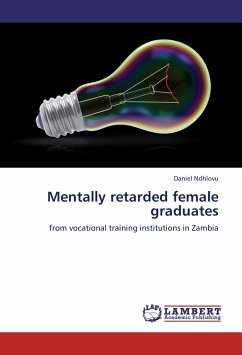
Mentally retarded female graduates
from vocational training institutions in Zambia
Versandkostenfrei!
Versandfertig in 6-10 Tagen
39,99 €
inkl. MwSt.

PAYBACK Punkte
20 °P sammeln!
The study found out that inadequate preparation for employment, lack of in-service training opportunities, job losses, unemployment and negative attitudes of the community, employers and parents, stigmatisation, sexual abuse, inability to pay for accommodation, lack of sex education and inability to access medical services contributed to poor life condition of the graduates. Those who felt their lives had improved attributed it to participation in social and economic activities within their homes and communities, reviewed curriculum, acquisition of entrepreneurial,communication skills, provisi...
The study found out that inadequate preparation for employment, lack of in-service training opportunities, job losses, unemployment and negative attitudes of the community, employers and parents, stigmatisation, sexual abuse, inability to pay for accommodation, lack of sex education and inability to access medical services contributed to poor life condition of the graduates. Those who felt their lives had improved attributed it to participation in social and economic activities within their homes and communities, reviewed curriculum, acquisition of entrepreneurial,communication skills, provision of in-service training opportunities and participation in workshops and seminars. On the basis of the study findings, the following were recommended: (i) Vocational training institutions should adequately prepare the female graduates with mental retardation for employment. (ii) the government of the Republic of Zambia and non-governmental organisations should continue supporting the graduates with mental retardation. (iii) Parents and community members should encourage the graduates to participate in social and economic activities.












